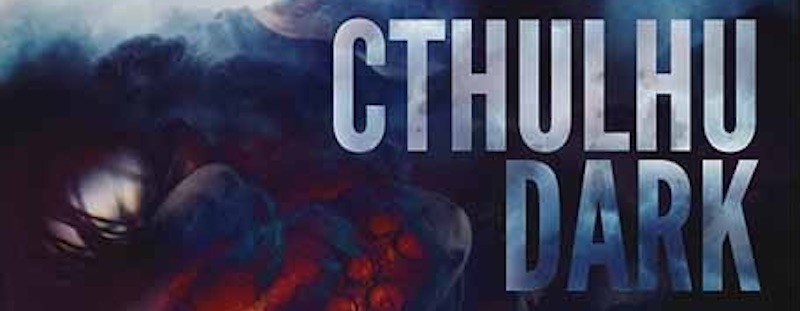Writing a 200 page sourcebook based on a game whose rules barely span two pages is, you might imagine, a Herculean yet pointless task. Except it isn’t. Allow me to introduce Cthulhu Dark.
Cthulhu Dark is a simple rules system for running Lovecraftian horror games. To do anything, you roll up to 3d6 and choose the highest result. The consequences may be good or bad. There’s an insanity mechanic, and if you fight a Mythos creature, you die. That’s about it. So why 200 pages?
Well, Graham Walmsley thought he had something to add, and he was right.

The book contains the rules and a guide on how to use or adapt them. Pretty standard stuff. What comes across here is the simplicity of the system and the bleakness of the Cthulhu Dark approach, mirroring Lovecraft’s original stories. There were no happy endings really, most of his protagonists died or went insane, and so will the player characters. This really begs the question: why play a game so apparently depressing?
Well, Cthulhu Dark allows players and GMs to co-create the kind of stories Lovecraft wrote: tales of mystery and investigation, of illusion and revelation, of hope and despair. If Call of Cthulhu is creates novel-length stories, Cthulhu Dark makes short stories. A case in point: Scott Dorward wrote the scenario Fairyland for Cthulhu Dark. I read it and was blown away. I then listened to a live play podcast where Dorward himself ran Fairyland. Let’s just say it was very unsettling and that chaos ensued. But in the scenario’s last moments, Dorward rounded off the story with such a sting in the tail that I’ve thought about it every day since. That was two months ago. It’s hard to see how he could have engineered such a bleak story using any other system.

After the rules, there’s a long section for GMs on writing and moderating horror scenarios. Starting with the big picture, Walmsley takes us through the construction of Lovecraftian horror before guiding us through writing, editing, and running scenarios, as well as a brief overview of the most common Mythos threats and tropes. This section has to be the single most useful guide for GMs to create original Horror material that I’ve seen. Not only does it take you through the process, but it provides GMs with tips, tricks and tools that are useful in any gaming context (but especially horror). The book is worth getting for this alone.

Following this, four new settings are introduced: London (1851), Arkham (1692), Jaiwo (2017), and Mumbai (2037). Each has one or two scenarios. While they are all great, the takeaway here is the inversion of the settings that the game is played in. In traditional Call of Cthulhu, investigators are commonly from the ‘top end’ of society: academics, dilettantes, professionals, members of the gentry, and when the Mythos presents itself, it’s often in the ‘lower end’ of town: speakeasies, rural backwaters, and the like. Cthulhu Dark inverts this, with working-class investigators of Mythos activity amongst society’s elites. A politician in league with the forces of chaos? It could explain a lot, actually….

Well, there you have it: everything you need to run a few scenarios or even a whole campaign in one volume. Enough GM wisdom to poke a stick at. A guide on how to write horror scenarios, and a fresh take on the Mythos to inspire terror. Recommended.

Check out this awesome Cthulhu Dark review by Play Dead Role Over
Get the pdf of the big sourcebook from drivethrurpg
Or get the hardback from All Rolled Up in the U.K.
Looking for Cthulhu Dark modules to run? Fairyland is a scenario and Miskatonic Shoreside Conservatory is a limited campaign. They’re goth great.
The ENNIE Award-winning game Trophy Dark was based on Cthulhu Dark: check it out here
Prefer a bit of sci-fi horror? check out Darkship, a Cthulhu Dark hack for Mothership: it’s pay-what-you-want.
Or you could just follow Graham’s Patreon while you wait for his new Sci-Fi horror game Cosmic Dark to be released

Leave a Reply
You must be logged in to post a comment.